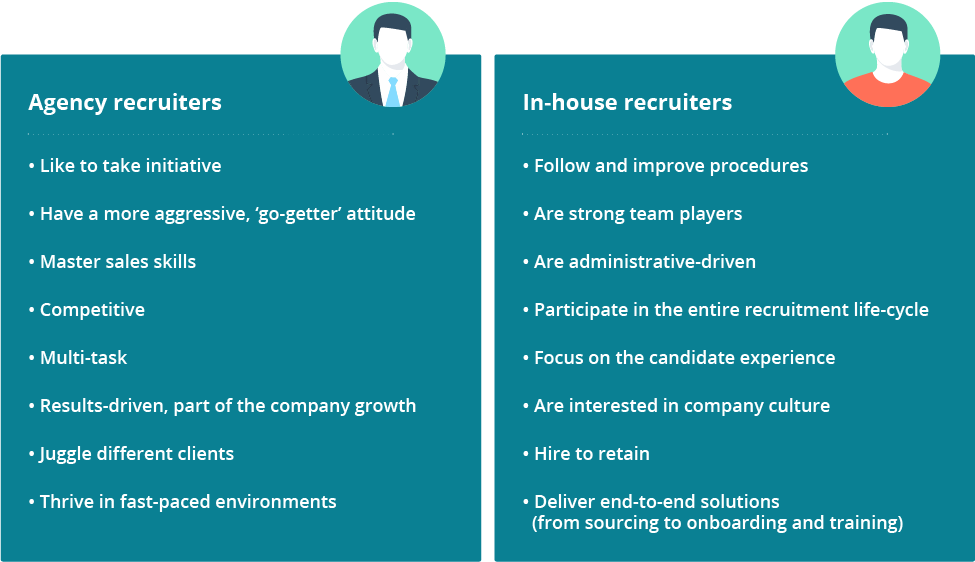Agency vs. in-house recruitment: Which is the right career fit for you?
Agency and in-house recruitment both involve sourcing talent, using HR tools, and building relationships. However, they differ in responsibilities, skills, salary options, branding, and career development. Agency recruiters work on commission and have a broader scope, while in-house recruiters are salaried employees focusing on company-specific roles.

Many recruiters face the choice between agency and in-house recruiting careers. To help you make the right choice for you, here’s an overview of their similarities and differences and a summary of the qualities you’ll need to succeed in each role:
Contents
Similarities between agency and in-house recruiting careers:
- Both have to be excellent sourcers: Good recruiters know that they need to use multiple sources to attract hard-to-find talent, regardless of where they work. Both agency and corporate recruiters engage in proactive sourcing, aiming to build talent pipelines and fill vacancies quickly.
Whether you work for an agency or in-house, sourcing is a powerful tool. Download our complete sourcing guide for free.
- Both have to be familiar with the best HR tools: Technology helps streamline the recruitment process. Recruiters use project management and email tools for their administrative duties, Applicant Tracking Systems and resume databases to manage candidates and online platforms to source their next hires.
- Both have to be excellent relationship builders: The key to being a successful recruiter is developing strong, long-term relationships. Good recruiters build these relationships by developing strong interpersonal skills, sending personalized messages and always following up with people.
The main differences between agency and in-house recruiting:
Scope of responsibilities:

Qualities and skills:

Salary and bonus options:

Branding:

Career development:

How to move from a staffing agency to a corporate recruiting role (and vice versa)
Agency and in-house recruiting may seem worlds apart. But, switching from one role to the other could be a smart move for your career, once you find what kind of work environment fits you best.
Panos Zervas, the Recruitment, Training and Development Manager at Bioiatriki SA shares some insights from his previous experience as a staffing recruiter.
You should be prepared to adapt to a different way of working. Also, think of what kind of environment will showcase your skills.
Though many of your daily duties might be similar, you should expect to face new challenges:

When deciding which path to choose, you should consider the main differences between staffing and corporate recruiters and determine which option best suits your personality and career goals. Whichever career path you choose, you need the same basic qualities to be a successful recruiter. You need to be able to understand people and develop long-term relationships.
Considering hiring a recruiting agency? See our tutorial on when to hire a recruiting agency.
Frequently asked questions
- What does an agency recruiter do?
- The recruiter is the go-to person for finding, screening, and attracting applicants to any position. They own every step of that process from end to beginning - advertisement including but not limited to online or traditional media advertising; reviewing resumes until they arrive at a qualified candidate.
- What is the difference between corporate and agency recruiting?
- The corporate recruiter is usually a salaried employee, while the agency's work depends on how much commission they can get for finding jobs. This means that it takes more effort to be successful as an Agency Recruiter than if you were working in Corporate HR.
- Is agency recruitment difficult?
- Yes, agency recruitment can require lots of time and energy on the part of a recruiter to find qualified candidates that meet the needs of a given position.




